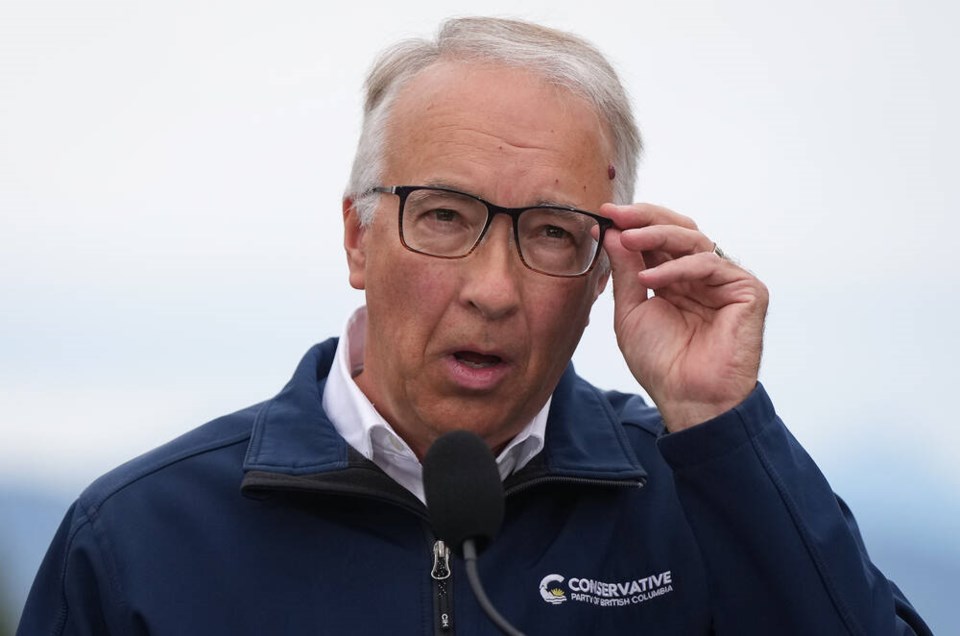The long wait for the BC Conservative’s costed election platform ended Tuesday with a document so vague it will be hard for even the voters who still care about the issue to muster up much interest.
Conservative Leader John Rustad unveiled the platform during a press conference at the University of British Columbia. Its 114-pages offer nothing new in the way of promises, as Rustad himself admitted was by design, but the accompanying six-page appendix outlined the much-anticipated costing.
Most notable was the revelation that, despite weeks of decrying BC New Democrats as reckless economic managers of the provincial purse due to record deficit spending, the Conservatives would run the deficit even higher in the short-term.
“Our deficit will be slightly larger than what the NDP are projecting for this year and for next year, as we add those critical additional spending, that additional $1.1-1.2 billion annually that will be added into that,” said Rustad.
“However, through our approach, with the investment that we need to see in our economy, the additional revenues that will come from there will offset, by the time we get to third and fourth year, a deficit is projected to be lower than what the NDP deficit is.
“And then projecting going forward through to a second term to being able to get to balance.”
Maybe Rustad had access to a secret second appendix that outlines fourth-to-eighth-year deficit projections, but it was certainly nowhere to be found in the Conservative documents.
In fact, the platform didn’t contain any deficit totals at all. Not even in year one.
It was up to Rustad to ballpark the figures verbally when pressed during his press conference.
“From what I’m hearing, $11 billion deficit first year, is that right?” a reporter asked.
“Correct,” said Rustad. “Well, sorry, about just over ten [billion], depending on where the NDP are with their numbers. It's hard to know exactly what it is, but our deficit will increase by just over a billion dollars in year one.”
The deficit spending will fund things like the “Rustad Rebate,” the elimination of PST on used cars, a second round of in vitro fertilization (IVF), more addictions treatment, more police and more judges, to name a few items in the platform.
But add it all up, and you’re left with the question of how a huge deficit squares with the Conservatives painting themselves as the party of prudent fiscal managers.
“When you take a look at the NDP platform, they have $24 billion worth of deficit scheduled over the next three years,” said Rustad. “Our deficit targets are significantly lower than that.”
Again, you’ll have to take Rustad’s word for it, because there’s not a stitch of evidence to back that up in the actual platform.
Much of the Conservative economic plan hinges on the idea of supercharging B.C.’s economy to 5.4 per cent annual growth, and in turn generating $10 billion in extra revenue annually by 2030.
That’s ambitious, to put it mildly, given the province’s current economic growth is 1 per cent, with projections of a rise to 2.3 per cent next year.
Rustad pointed to the mining sector, saying if B.C. could approve 16 mines currently in development it could meet his plan by providing $800 billion to the province’s GDP.
“Mining alone would be able to give us that additional growth that’s needed in this province,” he said.
It seems a wildly optimistic scenario — surely some of those 16 mines aren’t economically or environmentally feasible — but, nonetheless, that’s the kind of example the Conservative leader gave.
The remainder of the economic savings the Conservatives propose are part of a “core review of government spending” that will “re-allocate resources from NDP pet projects” while “all funding for front-line services including health, education and public safety will be maintained or increased,” read the platform.
There’s no shortage of fat to cut there, with the NDP having grown provincial spending more than 70 per cent since 2017, and alongside it a fat, bloated bureaucracy running all manner of expendable programs.
But will it be enough? The Conservatives aren’t promising voters much more than to try.
The BC Greens — who to their credit did an even better job than the Conservatives costing their platform, despite absolutely no hope of forming government — called it “a messy and outdated vision that ignores poverty, inequality and science.”
“The BC Conservatives are not ready to govern,” said leader Sonia Furstenau. “Their budget relies on magical thinking, assuming 5.4% annual economic growth every year for the next six years, without any plan on how to achieve this.”
The NDP also mustered an attack.
“On every important issue, Rustad has been making it up as he goes and has no plan to follow through on his promises,” said Niki Sharma, the NDP candidate for 麻豆传媒映画Hastings.
Not that the NDP has much high ground on economic performance, having racked up the largest deficits and debt in provincial history.
Nor does the party get to lecture others about platform professionalism, when its own staffers had to rush around with pencils to scratch out inaccurate and miscalculated costing numbers on its own platform launch day.
At this point, the NDP and Conservative platforms are only one step up from having been written in crayon.
They both call for increased spending, offset by a re-energized economy and cost efficiencies inside government. Both insist it’s possible without new taxes or front-line service cuts. Both promise to balance the books one day in the distant future. Both are bereft of details on how they’ll get there.
Voters deserved more, before Oct. 19. Unfortunately, they’ll have to settle for what they’ve got.
Rob Shaw has spent more than 16 years covering B.C. politics, now reporting for CHEK News and writing for Glacier Media. He is the co-author of the national bestselling book A Matter of Confidence, host of the weekly podcast Political Capital, and a regular guest on CBC Radio.



